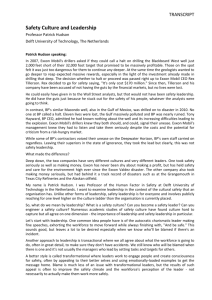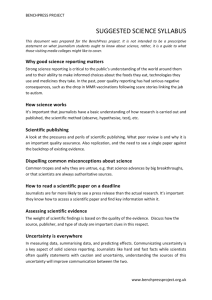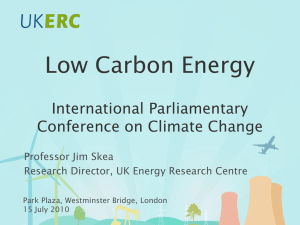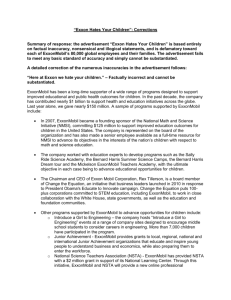The Magical Mystery Tour: Corporate Confusion on Climate Change
advertisement
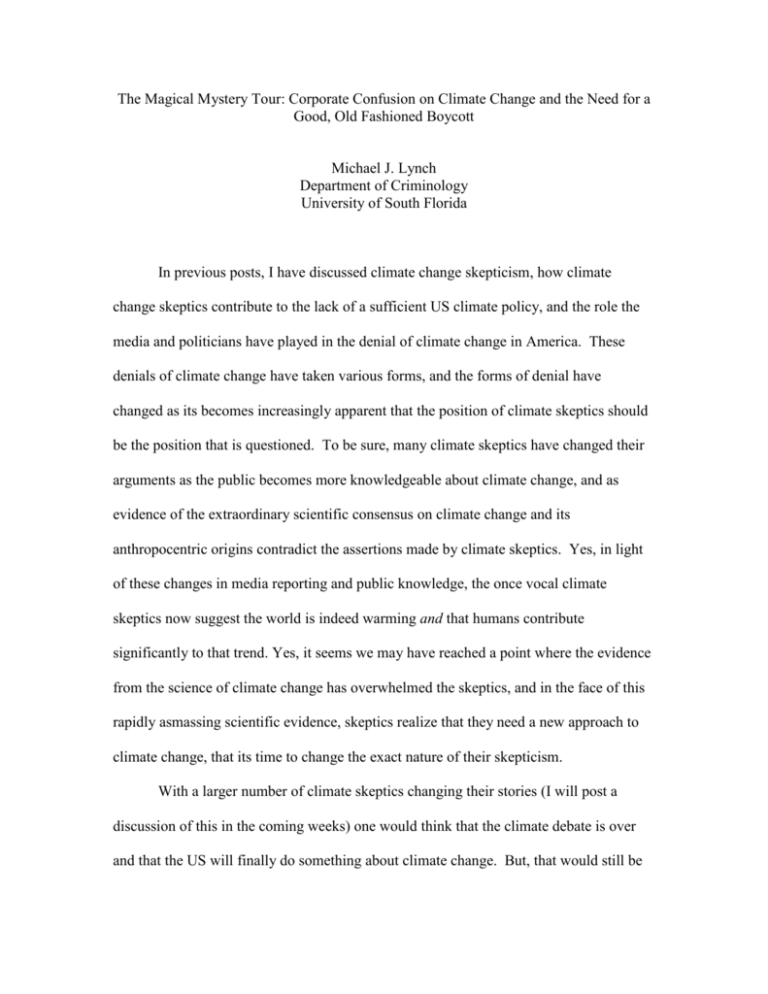
The Magical Mystery Tour: Corporate Confusion on Climate Change and the Need for a Good, Old Fashioned Boycott Michael J. Lynch Department of Criminology University of South Florida In previous posts, I have discussed climate change skepticism, how climate change skeptics contribute to the lack of a sufficient US climate policy, and the role the media and politicians have played in the denial of climate change in America. These denials of climate change have taken various forms, and the forms of denial have changed as its becomes increasingly apparent that the position of climate skeptics should be the position that is questioned. To be sure, many climate skeptics have changed their arguments as the public becomes more knowledgeable about climate change, and as evidence of the extraordinary scientific consensus on climate change and its anthropocentric origins contradict the assertions made by climate skeptics. Yes, in light of these changes in media reporting and public knowledge, the once vocal climate skeptics now suggest the world is indeed warming and that humans contribute significantly to that trend. Yes, it seems we may have reached a point where the evidence from the science of climate change has overwhelmed the skeptics, and in the face of this rapidly asmassing scientific evidence, skeptics realize that they need a new approach to climate change, that its time to change the exact nature of their skepticism. With a larger number of climate skeptics changing their stories (I will post a discussion of this in the coming weeks) one would think that the climate debate is over and that the US will finally do something about climate change. But, that would still be an optimistic outcome because the climate skeptics are still skeptical, they are just skeptical in a different way. While the skeptics now admit that climate change is happening, they are still skeptical that we need to do or can do anything about climate change. So, in the face of overwhelming scientific evidence, the skeptics have backed off of their claims that there is no such thing as global warming. Now, they have changed their tune to adopt a more scientific approach that, in the strictest sense has some scientific validity. That new position is really an old position that some scientists -- but not the media, public relations or corporate skeptics -- have long made the cornerstone of their arguments. That scientific skepticism has become one of the new cornerstones of the view taken by non-science skeptics of global warming, who have conveniently remade scientific skepticism claims into truths. That new skeptical climate position states that while climate change is happening, climate models themselves are not very precise, and thus the future path of climate change cannot be accurately predicted from present data and models. These climate models, the skeptics suggest, contain some inaccuracies and are sensitive to small changes in the modeling assumptions, and that when those assumptions are altered, this drastically changes the future prediction of how much the climate will warm. And, as climate change scientists will tell you themselves, this criticism has SOME merit. But, what climate scientist will also tell you is that the skeptics are wrong on this point because the pace of climate change has far exceeded climate model predictions, a condition that is the opposite of what the skeptics suggest. Recently, this story of the new approach to climate change skepticism unfolded in one, concise event that illustrates how all of these points intersect, and how corporations are now admitting that climate change is happening but at the same time are skeptical of how bad climate change really is, and whether humans can alter its path. This story involves one of the most active climate change skeptics sponsors, and a significant contributor to climate change, ExxonMobil. The New Climate Change Skepticism and ExxonMobil In late June, 2012, the new form of climate change skepticism was unveiled in a speech by Rex Tillerson, Chairmen, President and CEO of ExxonMobil. Tillerman had something “new” to say about climate change as the head of ExxonMobil, which had, until this week, official taken the position that climate change was not occurring. Tilleron publicly stated his position, which one can assume is the official position of ExxonMobil given Tillerson’s role in the company. In this statement, Tillerson publicly admitted that fossil fuel use contributes to climate change. You could probably have knocked over some of those who heard this news with a feather because of the strict climate skeptic position Exxon Mobil has long taken, and because ExxonMobil has spent significant sums fueling the climate skeptic position. But, the admission that fossil fuels help cause climate change was not all that Tillerson said in his public statement. So as not to disappoint our expectations about what the new ExxonMobil climate change position would entail, Tilleron qualified his statement. In qualifying that statement, Tillerson noted that while fossil fuel consumption promotes climate change, the consequences aren’t as serious as they have been depicted by scientist, or in the media, and that they are not as sever as the public might believe. Essentially, what Tillerson said was, first that while he accepts the idea that fossil fuel consumption promotes climate change, the real climate change story isn’t that bad. And second, that in his view there is what we might call continued significant hysteria around scientific findings related to climate change. Tillerson was more direct in his comments about the hysteria around climate change, and pointed the finger at some of the responsible parties. He blames the hysteria on a misunderstanding. In turn, he blamed the misunderstanding of climate change on two groups: first, “lazy journalists” seeking sensational stories to include in news reports to garner public attention, and second, the “illiterate” general public who doesn’t understand the meaning of climate science research. So, climate change is real, but because of lazy journalist and a stupid public, concern over climate change has effectively been blown out of proportion. I guess Tillerson hoped the lazy journalists didn’t report on his position, and the illiterate public didn’t read about it. Thus, in sum, ExxonMobil’s new interpretation of climate change amounts to the following: its real and there is scientific evidence of its existence; fossil fuel consumption is partially responsible; but the consequences of climate change have been blown out of proportion by the media and the public; as a result, there is little need to do anything about climate change. Of these five points, Tillerson was correct on two with respect to the US: that the scientific results are correct, and fossil fuels help drive climate changes. As for the media and the public in the US, there is still significant doubt. Among advanced western nations, for example, the US public has the weakest belief in climate change, while US media has tended to over-represent the climate skeptic position. Putting Your Foot in Your Mouth So, ExxonMobil’s official position on climate change appears to have been significantly modified from its strict skepticism. That would seem to be a positive step, except that in accepting the science of climate change, ExxonMobil still seems to think there is no need to take any action. On a public relations level, one wonders what Tillerson was thinking in making such a statement. Maybe the “lazy journalists” in the room wouldn’t notice they were being ridiculed. Maybe the “illiterate public” wouldn’t read or listen to the news Tillerson was generating. From a public relations standpoint, it appeared that Tillerson had produced a significant train wreck. But, he would, he thought, remedy that problem by referring to evidence in support of his contentions. To support his assertions about climate change‘s future being in doubt, Tillerson noted that ExxonMobil has had a two decade relationship with climate scientists at the Massachusetts Institute of Technology. ExxonMobil has learned a great deal from that two decades of cooperation with these MIT scientists. Tillerson asserted. Specifically, Tillerson stated that what ExxonMobil learned from these climate scientists was the following: climate change models are inaccurate and provide poor predictions of the climate’s future and the effect of fossil fuel consumption on the extent of global warming. What Tillerson was saying was that scientists at MIT would agree with his assessment that the future of climate change was questionable, and that media and public interpretations of climate change and the need for action were misguided according to what Tillerson had learned from MIT scientists. Unfortunately for Tillerson, someone forgot to tell the scientists at MIT about the contents of this speech, and what they were supposed to think. Equally as unfortunate, some “lazy” news journalist decided to ask some MIT climate researchers what they thought about Tilleron’s comments. The result: the scientists didn’t play along with Tillerson’s plan. When asked about Tillerson’s comments, Ronald Prinn, a professor of Atmospheric Sciences at MIT has this to say: “The models are certainly good enough to clearly show the benefits of mitigation policies compared to no policy, in lowering risks. We cannot wait for perfection in climate forecasts before taking action.” What? You mean scientists at MIT don’t agree with ExxonMobil’s new official position that its unnecessary to do anything about climate change? Shocking. Yet, that certainly appears to be what MIT scientists, Ronald Prinn suggested. In contrast to Tillerson’s view, Prinn suggested that we know enough to worry about and to do something about climate change, and that existing scientific models are sufficient to reach those conclusions. You mean that we know enough to worry? That the “lazy journalists” and “illiterate public” got it right? Seems that is what the MIT scientist’s comments imply. In making his claims, Tillerson was quite clear that MIT scientists would support his views, and that, for instance, it was unnecessary to do anything about climate change or that we can do anything about climate change. Prinn, a climate scientists at MIT, contradicted Tillerson on both points. So, MIT climate scientists do disagree with ExxonMobil and Tillerson. Of course, anyone familiar with the research on climate change or the research produced on that topic by MIT scientists could have told Tillerson this is what would have happened if he insisted on stating that MIT scientists supported ExxonMobil’s new climate position. But, ExxonMobil isn’t as concerned with the reality of climate change as it is with airing its non-scientific opinion about climate change publicly. Maybe Tillerson believes that the MIT scientists were part of the illiterate public too ? That they wouldn’t find out about what he said because the “lazy journalists” wouldn’t report it, or they would get it wrong? Or maybe he hoped MIT scientists only listen to FOX news broadcasts where this news would be remade. In effect, while Tillerson was now publicly willing to admit that fossil fuel consumption pushes climate change forward, his real message was that we can’t really worry about climate change because scientific models are imprecise and we can’t change the outcome anyway. In other words, ExxonMobil’s position is that climate change happens, fossil fuels helps promote climate change, BUT given ExxonMobil’s interpretation of science‘s empirical modeling of climate change, and despite the fact that Tillerson’s interpretation is inconsistencies with what scientists who have worked with ExxonMobil say, Tillerson and ExxonMobil still think there is little reason to do anything about climate change. Oh, and by the Way, Hydraulic-Fracturing is’t bad either . . . Clearly, this public stance will become a public relations nightmare for ExxonMobil. After all, Tillerson’s main point was that the real climate change problem, it seems, is that journalists are lazy, the public is stupid, and that climate science is inaccurate. Why should anyone besides journalists, the public and climate scientists be upset? But, Tillerson wasn’t done creating the ExxonMobil public relations nightmare. He made the nightmare worse with additional comments related to the practice of hydraoic-fracturing or hydro-fracking or fracking as it is more commonly designated, and its consequences. Hydrofracking involves the use of high pressure water drills and the use of secret chemicals (companies using this process do not need to reveal the mixtures used in making their hydro-fracking fluids, as these are considered a trade secret) to create underground pressure to drill for and increase the recovery of natural gas from shale rock formations. Stories of the negative effects of hydrofracturing methods on the environment, and communities near hydrofracking facilities have been making headlines as a result of these negative consequences for quite some time. But like climate change itself, Tillerson was suggesting we had nothing to worry about in terms of the consequence of hydrofracturing. Hydrofracking is safe. Well, mostly. Maybe. What Tillerson said about hydrofracturing according to reports made by the lazy reporters in the room actually contradicted his safety claim. According to the lazy reporters, Tillerson made the following statement: "The consequences of a misstep in a well, while large to the immediate people that live around that well, in the great scheme of things are pretty small.” Interesting. Hydrofracturing is only harmful to local resident. So, in other words, ExxonMobil admits that hydrofracking can cause severe consequences for people who live in proximity to hydrofracturing sites, but that the health of those people is inconsequential in the larger scope of things. So, essentially, we shouldn’t worry about hydrofracturing because it only harms some people. Perhaps it wasn’t clear to Tillerson what he had just admitted in public. He has now publicly made it known that ExxonMobil understands that hydrofracking may be detrimental to those who live near such sites, but that ExxonMobil is essentially willing to sacrifice some people because the overall impact of hydrofracking is, in his and ExxonMobil’s opinion, “pretty small” overall. Interpreted in a different way, what Tillerson said was, if you live near a fracking facility, you should worry, and ExxonMobil acknowledges that you may be harmed, BUT, the good news is that most people don’t need to worry. I’m sure that makes people who live near hydrofracking facilities feel much better. But maybe they are part of the illiterate public and won’t notice what TIllerson said. Public Boycott For one, I won’t be surprised if the public reaction to Tillerson’s speech is that people around the US, especially those who live near fracking sites, call for a boycott of ExxonMobil products. But, then again, this may be an overly optimistic outcome because most of the public doesn’t seem willing to invest the necessary energy to carry out such a plan. Nevertheless, boycotts are a good way for consumers and the general public to demonstrate their displeasure with a company. While ExxonMobil is a big company, its not the only company that produces the kinds of products its sell, and people can meet their needs by buying from other vendors. There’s no law that people must buy from ExxonMobil, and because our buying behaviors in a free market economic aren’t restricted, there is no reason that the public can’t boycott ExxonMobil. Perhaps Tillerson is hoping that the lazy journalists he insulted and the illiterate public can’t come up with the idea for a boycott on their own. It might surprise Tillerson to know that there have been some great public boycotts in the past, and a number of them have been aimed at gas/oil companies. The public, for example, once boycotted Shell products in response to Shell’s dealings in Nigeria, and many people cut up and mailed their Shell credit cards to the company as part of that campaign. If the dollar talks, maybe it should now. Thomas Jefferson, the third president of the US and the face on the two-dollar bill believed that the public should uses its democratic rights to force change, including political change, and he openly believed that to keep democracy safe and to remove undue influence from the democratic process, that the American people should stage a periodic revolution to maintain their powers and rights as citizens. This could be that time, and such a protest could become an extension of Occupy Wall Street. Whether or not people boycott ExxonMobil, the public needs to become more actively involved in the democratic process in the US and demand that American politicians protect them from climate change by passing significant climate related legislation. Such legislation will be good for America. It will, for example, open up investments in the alternative fuel market and create jobs; it will reduce pollution and improve air quality and reduce air pollution related illnesses in the US, which are quite widely distributed. It will make American more self reliant by using its technological knowledge to create an alternative fuel industry that doesn’t rely on foreign nations for most of its oil. It will reduce the use of coal, which is highly polluting and noxious, and a culprit in climate change. Given where scientists say we are headed with respect to global warming, none of these potential outcomes is bad news. Well, unless you are a well placed and well paid oil company executive, or a very large oil company stock holder, and the US government reduced the large amount of taxpayer money they give to you in subsidies.
